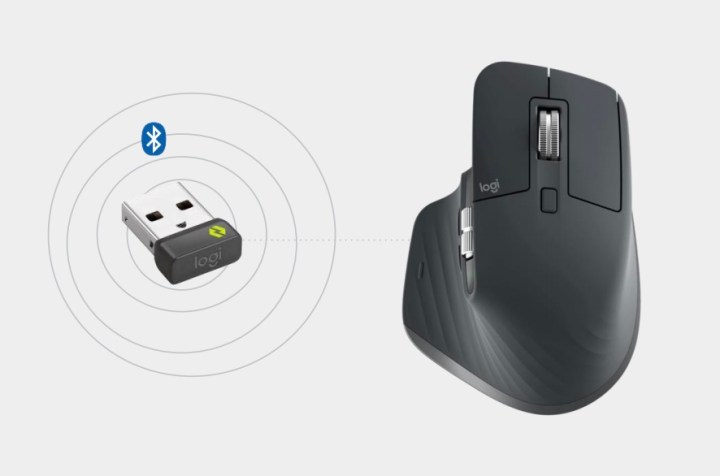
Even though Bluetooth offers a convenient way for us to connect our keyboards, mice, and headphones to our laptops, the wireless protocol may not cut it in crowded office environments. Factors like congestion, reliability, and security may affect Bluetooth’s performance in enterprise settings, which has prompted Logitech to deliver a new wireless standard called Logi Bolt. And like Logitech’s Unifying Receiver for home use before it, Logi Bolt is designed to connect compatible Logitech peripherals — like mice and keyboards — to your business PC through the use of a USB adapter.
In designing the Logi Bolt standard, the company claims that it wants to address three key areas: “Secure wireless connection, robust wireless signal, and cross-platform compatibility for mice and keyboards.” Logi Bolt peripherals are able to connect to PCs from up to 10 meters (33 feet) away, and like the Unifying Receiver, are designed to work in congested office environments with lots of mixed signals from other Bluetooth and Wi-Fi-enabled devices.
“On the performance side, Logi Bolt was really designed for enterprise customers [who are] seeing some performance degradation, a lag in their mice and keyboards,” said Joseph Mingori, Logitech’s vice president and general manager of Worldwide B2B, in a call ahead of Bolt’s announcement. “And as we did a lot of investigations from our engineering team, we really were able to pin this down to congested and noisy interference and very busy environments. So Logi Bolt was designed to have a very robust signal that is reliable, even in the most congested environments.”
The company claims that latency with peripherals connected through Bolt was significantly lower than “other commonly deployed wireless protocols for enterprise.”
Up to six devices can connect to each Bolt receiver, Mingori said, and Bolt devices won’t be backward compatible to work with other Logitech receivers. And since Logi Bolt was built on top of the Bluetooth Low Energy standard, you can also connect the Logi Bolt mouse and keyboard directly to devices that may not support the Bolt receivers — like iPad and Android tablets — using a standard Bluetooth connection for maximum cross-platform compatibility. The proprietary design allows peripherals to channel hop in a closed, secure connection to avoid latency and congestion.
Also, to address the security needs of the workplace, any firmware that contains security comes with an anti-rollback feature to ensure compliance. The company offers a robust software suite to help IT managers quickly deploy security updates to large numbers of devices. Bolt supports Bluetooth security mode 1, level 4 configurations, which makes it compliant with the Federal Information Processing Standards.

Bolt solutions, according to the company’s spokesperson, won’t be found in retail channels or even on Logitech’s webpage. Instead, enterprise customers will have to purchase from their contracted resellers.
At launch, a number of Logitech consumer products will be retooled to work with Bolt’s new wireless standard as well as Bluetooth, and these products — including the ERGO K860 Split Keyboard for Business, M575 Wireless Trackball Mouse for Business, MX Keys Combo for Business, MX Master 3 for Business, MX Anywhere 3 for Business, and MX Keys for Business — will launch with the “for Business” branding. The Bolt add-on for these products do command a slight price premium, given the added business support. For example, the Logitech MX Master 3 retails for $99, while the Bolt edition will sell for $119. The business version does add an extra year of warranty for the premium. The company will launch more devices with Bolt wireless technology in the future.
“So, essentially, we will look across our existing consumer portfolio and be very selective about which solutions we created as ‘for business’ solutions,” Mingori said of Logitech’s ambitions for expanding the Bolt lineup. “And then we’ll build off that as our foundational pillar for this portion of the portfolio. And we’ll expand into new solutions that are completely dedicated for B2B that you wouldn’t see in the consumer space at all — dedicated solutions based on vertical customization, like for health care, education, and other areas.”
It will be interesting to see how Logitech can evolve Bolt to make it more meaningful for those who need enterprise-grade peripherals for laptops and PCs designed specifically for businesses. Similar to speakers that are tuned by Dolby Atmos or Harmon Kardon on consumer laptops, if Logitech can partner with leading manufacturers like Dell, HP, and Lenovo to build Bolt into business laptops, the company could see a big uptick in adaption to the more than 130 million products it already ships each year.


